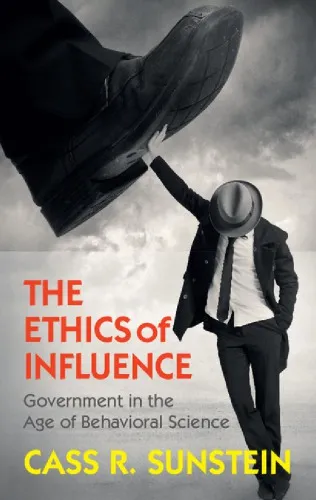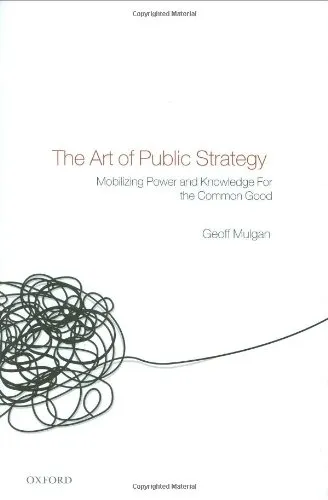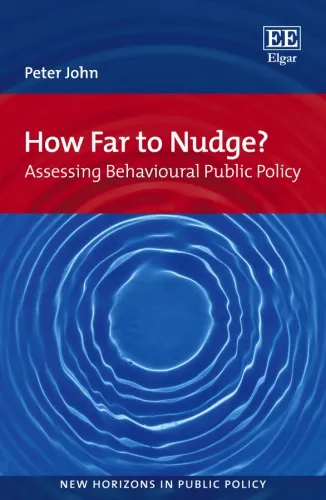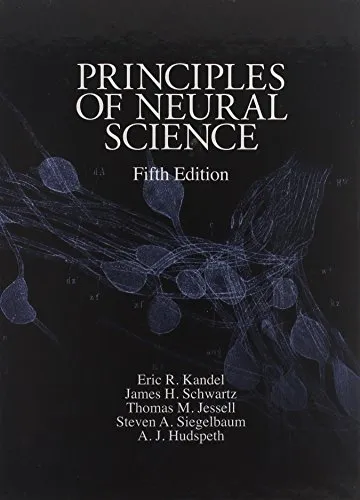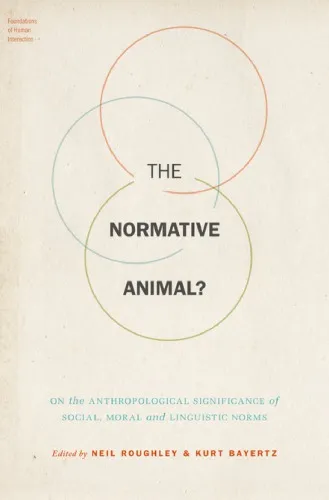The Ethics of Influence: Government in the Age of Behavioral Science
4.0
بر اساس نظر کاربران

شما میتونید سوالاتتون در باره کتاب رو از هوش مصنوعیش بعد از ورود بپرسید
هر دانلود یا پرسش از هوش مصنوعی 2 امتیاز لازم دارد، برای بدست آوردن امتیاز رایگان، به صفحه ی راهنمای امتیازات سر بزنید و یک سری کار ارزشمند انجام بدینکتاب های مرتبط:
معرفی جامع کتاب "The Ethics of Influence: Government in the Age of Behavioral Science"
کتاب The Ethics of Influence: Government in the Age of Behavioral Science نوشته کس آر. سانستین یکی از برجستهترین آثار حوزه علوم رفتاری و اخلاق در مدیریت دولتی است. این کتاب به بررسی نقش و مسئولیتهای اخلاقی دولتها در استفاده از علم رفتاری یا Behavioral Science برای تأثیرگذاری بر رفتار شهروندان میپردازد.
خلاصهای از کتاب
در دنیای امروز، علم رفتاری به یکی از ابزارهای کلیدی در سیاستگذاری تبدیل شده است. از طریق مفاهیمی مانند Nudge، دولتها میتوانند رفتارهای شهروندان را بهبود بخشند بیآنکه مجبور به وضع قوانین سفت و سخت یا تحمیل فشار مستقیم شوند. اما استفاده از این ابزارهای مؤثر همراه با سؤالات اخلاقی مهمی است: آیا دولتها حق دارند رفتارهای انسانها را تغییر دهند؟ آیا چنین دخالتهایی سلطهگرایانه نیست؟ و چگونه میتوان مطمئن شد که اقدامات دولتها شفاف و منصفانه است؟
سانستین به این پرسشها پاسخ میدهد و توضیح میدهد که چگونه میتوان از ابزارهای Behavioral Science به شیوهای که انسانها را توانمند و انتخابهایشان را آزاد کند استفاده کرد. او مثالهای واقعی از سیاستگذاریهای موفق را ارائه میدهد و نشان میدهد که استفاده از این ابزارها چگونه هم اخلاقی است و هم مؤثر.
نکات کلیدی کتاب
- فراهم کردن زمینهای شفاف برای استفاده اخلاقی از قدرت تأثیرگذاری دولتها بر رفتار شهروندان.
- توضیح مفهوم Nudge و کاربردهای آن در سیاستگذاریهای عمومی.
- ارائه چهارچوبی برای تضمین شفافیت، انصاف، و حفظ آزادی انتخاب فردی در استفاده از علوم رفتاری.
- بررسی نقش اخلاق در مقابل کارایی در سیاستگذاری دولتی و تأثیرگذاری بر رفتار مردم.
جملات مشهور کتاب
"The goal is not to dictate choices, but to make it easier for people to make better decisions without imposing unnecessary restrictions."
"A legitimate government should respect freedom of choice, but also have a role in reducing risks and improving welfare."
این نقلقولها به خوبی اهمیت و رویکرد سانستین را در استفاده از ابزارهای Behavioral Science نشان میدهند.
چرا این کتاب مهم است؟
کتاب The Ethics of Influence نشاندهنده دورانی است که در آن علم، اخلاق و سیاست به روشنی در هم تنیده شدهاند. سانستین بهعنوان یکی از پیشگامان مفهوم Nudge، اهمیت بهرهگیری از علوم رفتاری را در حل مسائل جهانی مانند سلامت عمومی، محیط زیست و مدیریت منابع بررسی میکند. همزمان، او بر اهمیت حفظ آزادیهای فردی و اخلاق تأکید دارد.
این کتاب نه تنها برای سیاستگذاران، بلکه برای افراد علاقهمند به مفاهیم روانشناسی، اخلاق و حکمرانی مدرن نیز آموزنده است. با کمک این کتاب میتوان بینش عمیقی در مورد نحوه اجرای سیاستهای عمومی و اثرات آن بر جامعه پیدا کرد.
Welcome to the world of behavioral sciences and their profound impact on modern governance. "The Ethics of Influence: Government in the Age of Behavioral Science", authored by Cass R. Sunstein, offers a deep dive into the ethical implications of governments utilizing behavioral science to shape human behavior. This introduction provides a detailed overview of the book and explores its significance in today's socio-political landscape.
Detailed Summary of the Book
In this compelling work, Cass R. Sunstein examines how governments around the world have increasingly adopted insights from behavioral science—drawing on concepts like "nudging"—to guide citizens' decisions without resorting to coercion or heavy-handed regulations. At the heart of this paradigm lies an understanding of human psychology: we are not always rational actors. Instead, cognitive biases, heuristics, and contextual influences play a significant role in our decision-making processes.
The book meticulously explores the ethical dimensions of these "nudges." When governments intervene to encourage certain choices, how far is too far? Can they strike a balance between respecting personal autonomy and promoting collective well-being? Sunstein introduces readers to the concept of "libertarian paternalism," which advocates for policies that nudge people toward beneficial decisions while preserving freedom of choice. He emphasizes that nudges should be transparent, easily avoidable, and welfare-enhancing—always designed with the intentions and interests of the people in mind.
Through numerous examples, the book delves into how nudging has been applied in areas such as public health, financial decision-making, climate change, and education. From reformatting default options in retirement savings plans to steering people toward healthier food choices through subtle design changes in cafeterias, Sunstein provides a rich array of case studies. The book also discusses criticisms of nudging, addressing concerns about manipulation, transparency, and the role of democratic values in policy design.
Key Takeaways
- The use of nudging brings behavioral science into the realm of good governance, aiming to improve decision-making outcomes without limiting personal freedom.
- "Libertarian paternalism" provides a middle ground between command-and-control regulation and free-market absolutism by ensuring that policies are both beneficial and non-coercive.
- Nudges are most effective when they are evidence-based, transparent, and respectful of individual autonomy.
- Ethics play a central role in the design and implementation of nudges, emphasizing values such as fairness, transparency, and openness to public scrutiny.
- The application of nudging in policymaking raises critical questions about governmental authority, citizens' rights, and the balance between influence and manipulation.
Famous Quotes from the Book
"A nudge is any aspect of the choice architecture that alters people's behavior in a predictable way without forbidding any options or significantly changing their economic incentives."
"The power of nudges rests in their ability to respect freedom of choice while also helping people live healthier, happier, and more fulfilling lives."
"Ethically, nudging requires us to focus on transparency and fidelity to the welfare of those whose behavior we are attempting to influence."
Why This Book Matters
The importance of "The Ethics of Influence" cannot be overstated, particularly as behavioral science becomes an increasingly central tool in public policy. In an era where governments face complex challenges such as climate change, obesity epidemics, and financial insecurity, conventional approaches to regulation are often insufficient. This book serves as a critical guide for policymakers, practitioners, and citizens seeking to understand how soft interventions can improve societal outcomes while respecting personal freedoms.
Moreover, the book pushes readers to confront difficult philosophical and moral questions regarding the nature of influence and consent. As the prevalence of nudging grows in technological arenas—through algorithms, personalization, and artificial intelligence—Sunstein’s insights offer a necessary ethical framework to ensure these tools are used responsibly.
By focusing on both the promise and the pitfalls of behavioral science, Cass R. Sunstein equips readers with the tools to critically evaluate government interventions and their ethical implications. Whether you are a policymaker, scholar, or citizen, this book will challenge and inspire you to think differently about the role of influence in human decision-making.
دانلود رایگان مستقیم
شما میتونید سوالاتتون در باره کتاب رو از هوش مصنوعیش بعد از ورود بپرسید
دسترسی به کتابها از طریق پلتفرمهای قانونی و کتابخانههای عمومی نه تنها از حقوق نویسندگان و ناشران حمایت میکند، بلکه به پایداری فرهنگ کتابخوانی نیز کمک میرساند. پیش از دانلود، لحظهای به بررسی این گزینهها فکر کنید.
این کتاب رو در پلتفرم های دیگه ببینید
WorldCat به شما کمک میکنه تا کتاب ها رو در کتابخانه های سراسر دنیا پیدا کنید
امتیازها، نظرات تخصصی و صحبت ها درباره کتاب را در Goodreads ببینید
کتابهای کمیاب یا دست دوم را در AbeBooks پیدا کنید و بخرید
1207
بازدید4.0
امتیاز0
نظر98%
رضایتنظرات:
4.0
بر اساس 0 نظر کاربران
Questions & Answers
Ask questions about this book or help others by answering
No questions yet. Be the first to ask!
